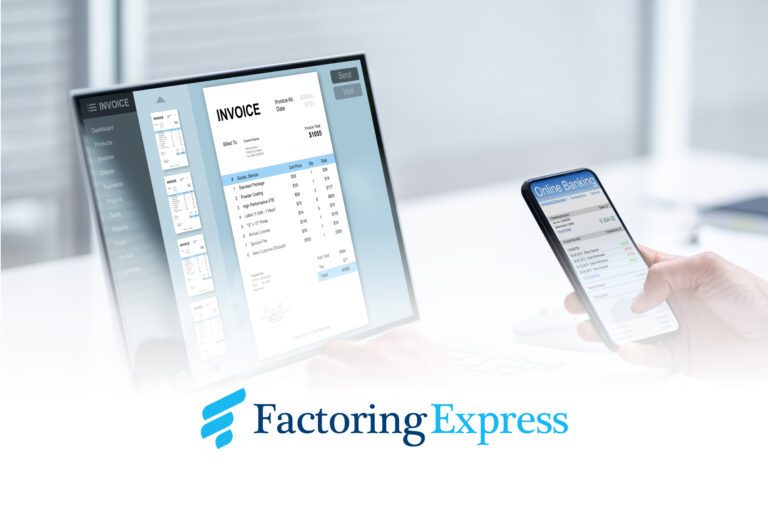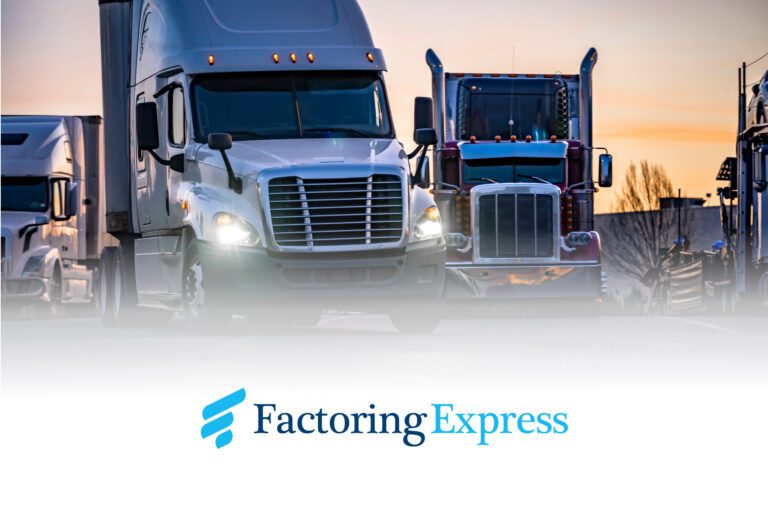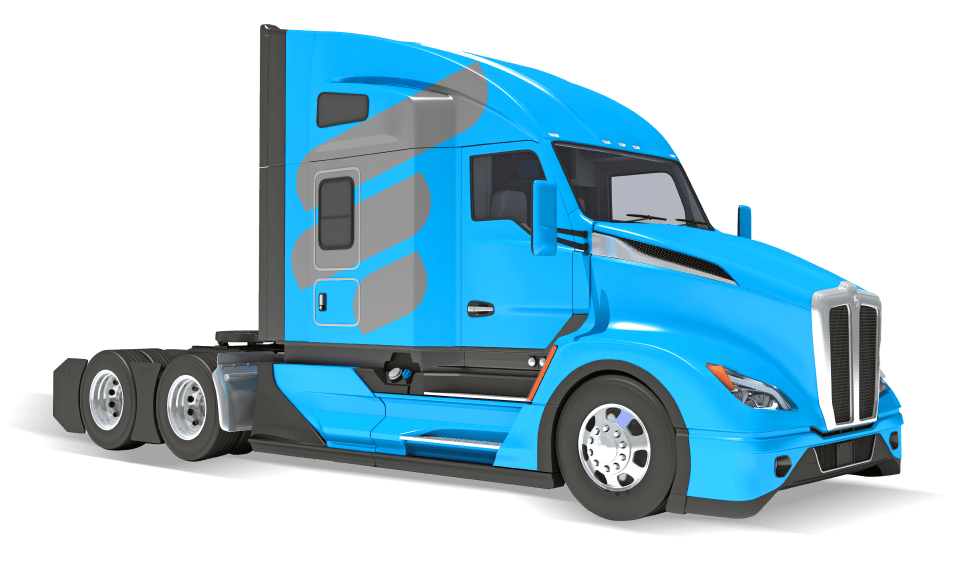Start Your Trucking Company
Don’t start a trucking business without a plan.
Get Ready: 1 – 2 – 3
1. Weigh your options.
• What kind of trucking operation will best suit your lifestyle?
• Should you focus on short runs or coast-to-coast trips?
• Will you run the business solo or hire employees?
• Will you lease or purchase a truck and/or trailer?
2. Create a business plan.
Before you start your trucking business, you need a business plan. The plan you make depends on your specific situation. The more planning, the less chance of expensive mistakes. Factoring Express offers free advice and can help you get on the right track. One of the first questions to answer is:
“Where will I find the money to start my business?”
The equipment, licensing and insurance can be expensive. It’s also a good idea to start with enough finances to cover your first few months of operation.
Find a good CPA and a business adviser to answer your financial questions. An adviser can help you work out a list of business goals and expectations. Some questions to answer include:
• What type of legal entity will this be?
• How will you pay to start up the business?
• What kind of licensing and permits will you need?
• What kind of insurance is needed and what’s the cost?
• Will you buy or lease your equipment?
• How will you pay for it?
• What type of freight will you haul?
• Where will you store your equipment?
• How will you maintain your truck and trailer?
• Where will you find loads?
• Will you use a dispatch service?
• How will you assure payment for your work?
• Who will handle invoicing/billing?
• Will you need help with accounting? Computer software?
• Will you hire employees? Work with contractors?
3. Talk to someone.
If possible, find someone that has been successful in the trucking industry and ask:
• What are the biggest challenges in this business?
• What do you wish you’d known before you started a trucking business?
Get Set: 1 – 2 – 3
1. Get licensed & experienced.
• Arm yourself with the commercial driver’s license (CDL) you need. Training programs can last 3 – 12 weeks and cost between $3,000 – $6,000.
• Gain experience working for a trucking company. (Many business owner-operators start out this way.) Trucking companies sometimes offer training programs and CDL school.
2. Choose your business type.
For legal purposes, business types are labeled differently. Each business type has pros and cons. A CPA will help you understand more about each type of business and which one is right for you.
Some of the most common business types are:
• sole proprietorship
• partnership
• limited liability company (LLC)
• corporation (c-corp., s-corp., etc.)
3. File your business type and name.
• You can file an employer ID number directly on the IRS website. https://www.irs.gov/businesses/small-businesses-self-employed/apply-for-an-employer-identification-number-ein-online
• Look up the Secretary of State (SOS) website for your state. Most will allow you to file your business directly onsite.
GO: 1 – 2 – 3
1. Know the guidelines.
Before you roll, be aware of several trucking guidelines that your company must follow. The U.S. Small Business Administration list of links can help you sort through trucking business requirements which include:
• Authority to Operate (MC Number): all carriers must have authority from the DOT to haul freight across state lines. This authority also regulates which types of freight you can haul.
• USDOT Number: used to collect and monitor your company’s safety information, inspections and record.
• Heavy Vehicle Use Tax: this fee applies to all trucks that weight more than 55,000 pounds.
• International Registration Plan: an IRP distributes fees based on distance traveled in each U.S. state or Canadian province. Companies must register on the state’s transportation website.
• International Fuel Tax Agreement (IFTA): this is in place among the lower 48 states. It exists to simplify how carriers report fuel use. Carriers file a quarterly fuel tax report that determines their tax and distributes the tax to the states. Your truck must have an IFTA decal on it, and you must apply for a new one every year.
• State Weight Distance Permits for New York (NY); Kentucky (KY); Oregon (OR); New Mexico (NM).
–New York (NY)
–Kentucky (KY)
–Oregon (OR)
–New Mexico (NM)
• UCR (Unified Carrier Registration): requires individuals and companies that operate commercial motor vehicles in interstate or international commerce, or individuals or companies that make the arrangements for the transportation of cargo and goods, to register their businesses and pay an annual fee based on the size of their fleet.
• BOC-3 Filing: this officially registers someone as your company’s process agent. This person will get served on your behalf in any legal proceeding.
• Drug and Alcohol Testing Program: The Federal Motor Carrier Safety Administration (FMCSA), along with the Department of Transportation (DOT), requires that persons subject to the commercial driver’s license (CDL) requirements and their employers follow alcohol and drug testing rules. These rules include procedures for testing, frequency of tests, and substances tested for.
• ELD (Electronic Logging Devise): It is DOT-certified electronic hardware that connects to the vehicle’s engine to record driving hours. It includes a screen for the driver so they can monitor their current status as well as the ability to print hour logs when required by DOT inspectors.
2. Get insured.
The Owner-Operator Independent Drivers Association (OOIDA) has information on trucking insurance at www.ooidatruckinsurance.com.
Here are some initial insurance needs for a trucking business:
• Primary Liability Insurance: You must carry at least $750,000 in primary liability insurance. This covers damages or injury that result from an accident when it’s your fault.
• Cargo insurance: covers theft or damage to the freight you are hauling. $100,000 is the most common amount for cargo coverage.
• Physical damage insurance: covers truck damage where you are not liable.
• Non-trucking use (Bobtail): covers your liability if your truck is involved in an accident when you’re not hauling a load for someone else.
3. Get a truck and / or trailer.
You can lease or buy your equipment. If you choose to lease, here are some kinds of leasing agreements:
• Operating (Full-Service) Lease: You take care of maintenance, taxes and permits, and you walk away at the end of the lease.
• Terminal Rental Adjustment Clause (TRAC) Lease: You make a small down payment, and at the end of the lease, you can cover the difference in value and purchase the truck. The leasing company can also sell the truck at the end of the agreement. If the leasing company makes money on the sale, you get the profit. If it loses money, you pay the difference.
• Lease-Purchase Plans: These are for truckers who don’t have enough for a down payment or have bad credit. You may pay more in the long run on these plans.
GROW!
Now that everything is in place, you will be looking for loads and moving forward. Here are some helpful links:
• Activate MC Number (Authority) – Get your operating authority without all the hassle.
• Set up with All About Dispatch for dispatch services. They will find you loads and handle all the negotiations and administrative work. The charge for such services is 6.5% of the contracted amount.
• Load Boards – Looking to find loads by yourself? Below is the list of biggest load boards in the industry.
–www.truckersedge.net
–www.truckstop.com
–www.getloaded.com
–www.123loadboard.com
–www.haulhound.com
• Fuel Card – Save on fuel costs at more than 1,900 truck stops nationwide.
– www.fleetone.com
– www.efsllc.com
–www.truckersedge.net/products/fuel-card
• Freight Factoring – Get paid for your invoices within 24 hours Factoring Express (factoringexpress.com).
• Invoice Processing – Factoring Express can create and process your invoices with just copies of your rate confirmation and signed Bill Of Lading.
• Broker Credit Verification – Using Ansonia and Factors Network credit agencies Factoring Express will verify the credit worthiness of any broker.
Learn about How Much Does It Cost To Start a Trucking Company?
If you have any follow up questions feel free to email us at [email protected].




